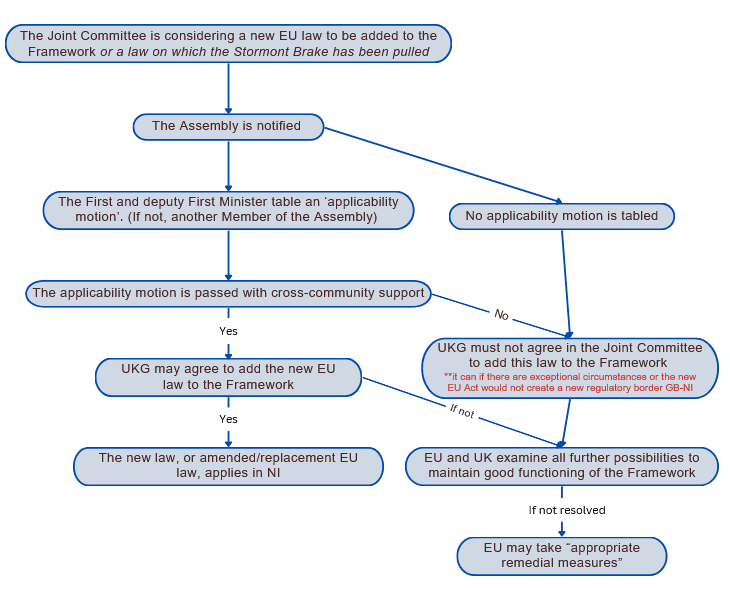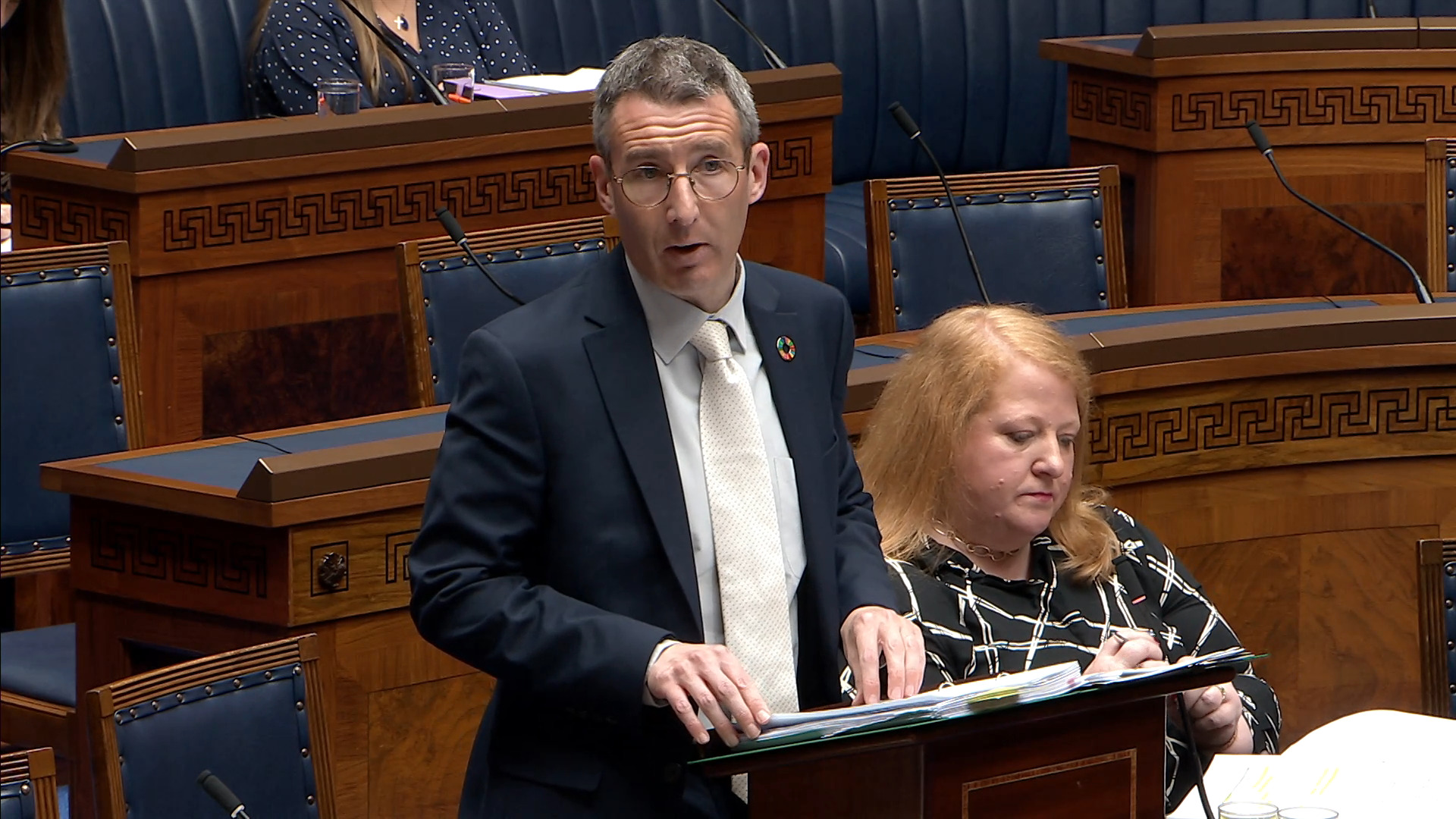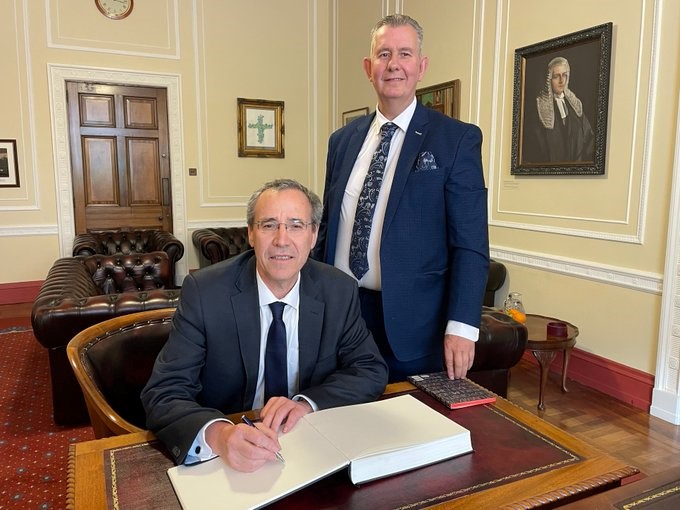Brexit & Beyond newsletter
29 April 2024
 Welcome to the 29 April 2024 Brexit & Beyond newsletter
Welcome to the 29 April 2024 Brexit & Beyond newsletter
Last week, a meeting of the Specialised Committee on the Implementation of the Windsor Framework was held. The Minister for Agriculture, Environment and Rural Affairs responded to questions in the Assembly chamber, including on the Windsor Framework (Implementation) Regulations 2024 and a Carbon Border Adjustment Mechanism. The Secretary of State for Northern Ireland took questions in the House of Commons.
Today, the Assembly is debating an applicability motion; Ministers in the Executive Office and Department for the Economy will take questions from MLAs. This week, the Committee for Finance will be briefed on the Procurement Common Framework. The Windsor Framework Democratic Scrutiny Committee will consider Regulation (EU) 2024/1143 on geographical indications for wine, spirit drinks and agricultural products.
Tomorrow, 30 April, the UK Government will introduce documentary checks and physical and identity checks for medium-risk animal products, plant and plant products imported to Great Britain from the EU, as set out in its Border Target Operating Model.
Applicability motion- Regulation (EU) 2023/2419
Today, the Assembly will debate an applicability motion on Regulation (EU) 2023/2419 on the labelling of organic pet food. Before the UK can agree with the EU in the Joint Committee that a new EU law should apply in NI, the Assembly must indicate cross-community support for the new law to be added to the Windsor Framework by passing an applicability motion. Read more about applicability motions and how new EU laws may apply in NI.

The process for applicability motions
The First Minister and the deputy First Minister may table the motion, otherwise another member of the Assembly may then do so. The deputy First Minister last week outlined their position, saying, “A decision to jointly table an applicability motion for newly published EU acts will be considered on a case-by-case basis…In this case, we believe that applying the regulation would avoid any new regulatory barriers in the United Kingdom and North/South, which is why we have made the decision to jointly table that motion.”
The UK Government has published an explanatory memorandum on the regulation. Under the regulation, pet food will need to be produced with at least 95% organic agricultural ingredients, rather than 100%, to be labelled organic. The Windsor Framework Democratic Scrutiny Committee previously heard oral evidence from the Department of Agriculture, Environment and Rural Affairs on this regulation and received written evidence from trade association UK Pet Food, which raised concerns about the labelling requirements for organic food, and for certain foods using the green lane. The Government’s view is that the regulation “should not affect pet food moving from Great Britain to Northern Ireland via the Northern Ireland Retail Movement Scheme, though this will require further engagement with the European Commission”.
Specialised Committee on the Implementation of the Windsor Framework
The Specialised Committee on the Implementation of the Windsor Framework met on 25 April 2024. A joint statement was published. Officials from the UK Government and European Commission “took stock of the work undertaken by both sides on the implementation of the Windsor Framework since the last meeting” in particular regarding agri-food and customs, in light of the provisions that took effect in Autumn 2023 (the expanded UK Internal Market Scheme and NI Retail Movement Scheme). The co-chairs took stock of preparations for the forthcoming UK-EU Joint Committee. The EU and UK state, “Having discussed the outstanding issues as well as the upcoming milestones, they agreed that intensive work should continue, with renewed efforts and commitment, to ensure the full implementation of all the elements of the Framework in a faithful and timely way.” View upcoming milestones relating to the implementation of the Windsor Framework on our website.
The Committee also took stock of the work of the Joint Consultative Working Group and its structured sub-groups, and “reiterated the importance of continued joint engagement with Northern Ireland stakeholders.”
Plenary business
On 22 April, Steve Aiken made a statement on the late notification of two EU regulations to the Windsor Framework Democratic Scrutiny Committee, explaining that this meant the Committee could not carry out an inquiry within the deadline, nor could the Stormont Brake have been pulled within deadline. He said this is “not acceptable”, adding, “We should be in a situation where we are able to have redress and are not stuck with strict timelines that even our Cabinet Office cannot comply with.”
Jim Allister made a statement on official controls at ports in NI. He said, “What will be imposed on business is the fact that, under EU law, the very checks on goods coming into Northern Ireland from the rest of the United Kingdom — Great Britain — will now be charged out to business…it really is beyond a scandal and a shame that businesses trading with Great Britain will have charged to them the checks that are being forced on us by the protocol.”
Agriculture, Environment and Rural Affairs
At Question Time, the Minister for Agriculture, Environment and Rural Affairs was asked about the resumption of livestock movements to and from Great Britain. He explained that as a result of confirmed cases of bluetongue virus in England, trade in all live ruminants from GB to NI has been restricted. Minister Muir said this area “falls under the direction and control of the Secretary of State for Environment, Food and Rural Affairs, as provided for in regulation 3 of the Windsor Framework (Implementation) Regulations 2024”. He said there are 19 such areas and has provided further details in a paper in the Assembly Library.
In response to various written questions on the implementation of the Windsor Framework, the Minister has stated they are now subject to the direction and control of the Secretary of State, including implementation of the Official Controls Regulation (EU) 2017/625; matters relating to the movement of trees from Great Britain to Northern Ireland; matters relating to the import and sale of non-native seed species; movement of seed potatoes; and the movement of sanitary and phytosanitary goods from Great Britain to Northern Ireland.
Regarding the movement of trees, the Minister understands that the Horticultural Working Group (as promised in the ‘Safeguarding the Union’ Command Paper) has been established by the UK Government but said, “To date [his] Department has not received an invitation to attend”.

Minister for Agriculture, Environment and Rural Affairs Andrew Muir
Minister Muir stated that there was no formal consultation on the Windsor Framework (Implementation) Regulations 2024. He told MLAs he had outlined his concerns about the issues to the Secretary of State and the Minister of State, Steve Baker. He said, “What has been brought forward is extremely challenging operationally.” He noted the above example of receiving a question about an issue that is under the direction and control of the Secretary of State for Environment, Food and Rural Affairs. He stated, “I seek to participate, answer questions and engage with Members of the House on every matter that I can, but, if something is under the direction and control of the Secretary of State, I am impeded by that.” Minister Muir noted, “As set out in the guidance, there is a requirement for engagement with relevant Ministers, and I have made it clear that I wish to see those engagements occur monthly because of the operational challenges.” He added, “The regulations are unprecedented and are a movement in the devolved space. I am assured that they have been made to uphold our international obligations under the Windsor Framework, but I am conscious of the practical challenges.”
The Minister stated in a written question, “I and my officials were given opportunity to comment on the statutory guidance referenced in regulation 4 and also on the extent to which Secretary of State might exercise his discretion as provided for in regulation 3. In providing comment, my aim was to raise relevant concerns, ensure clarity on the scope of the regulations and on how they might work in operation.” On Thursday, in response to a written question, he told Jim Allister, “I understand that the Department has not to date received any specific instructions on how, for the remaining areas, the Secretary of State wishes officials to take forward their statutory obligations. I raised the Member’s request that members are informed when directions are issued under the Windsor Framework (Implementation) Regulations 2024 when meeting Minister of State Rt. Hon. Steve Baker MP on Tuesday 23 April 2024.”
You can keep up-to-date and read all written questions to Ministers on the Assembly website.
CBAM
In plenary, the Minister was also asked about the Carbon Border Adjustment Mechanism (CBAM). He said officials are working closely with counterparts in the UK Government “to develop an understanding of how the mechanism may affect relevant stakeholders in Northern Ireland”. The EU CBAM has been operating on a transitional basis since 1 October 2023 and will come into full operation on 1 January 2026. The Minister noted the UK Government’s intention to introduce a UK CBAM from 2027 and noted, the EU CBAM “can only apply in Northern Ireland with the agreement of the UK and in line with the democratic safeguards of the Windsor Framework. Consequently, as things stand, the EU CBAM should not impact on trade between Northern Ireland and GB”. Minister Muir said, “At present, the impact of the EU CBAM on Northern Ireland companies exporting to the Republic of Ireland is not clear… As this stage, it remains unclear how the EU CBAM will affect Northern Ireland stakeholders.” He said that to date, the EU has not approached the UK with a view to including the CBAM within the scope of the Windsor Framework.
Politico reports on the potential implications of different CBAM systems in the UK and EU. Adam Berman of Energy UK explains, “Unfortunately, like any trade issue with Northern Ireland, this is one of so many issues where, without a relatively high degree of alignment on both sides, there is simply no solution other than to put up significant new trade barriers. Which, in this case, would penalize primarily businesses in Northern Ireland.” The Centre for Inclusive Trade Policy at the University of Sussex has written a briefing on the complexity of the EU CBAM in Northern Ireland.
Questions in the House of Commons
At Question Time in the House of Commons, Lee Anderson (Reform UK) told the Secretary of State for Northern Ireland that he voted for the Windsor Framework “because the Prime Minister said it removed the Irish sea border, yet £192 million is budgeted to be spent on installing border posts for the non-existent Irish border”. He asked Chris Heaton-Harris about the number of checks on people and goods travelling through GB and NI and whether those checks increased or decreased since the introduction of the Windsor Framework.
The Secretary of State said, “The answer does rather depend on whether the numbers he has looked at are for checks in the red lane or the green lane, or for checks under the new internal market scheme. The numbers rise and fall depending on a whole host of factors. When trade increases, as it is doing, so will the number of checks as a whole, but the percentage will go down, because the checks will be mostly on goods going through the red lane.” Heaton-Harris went on to say, “We will soon get to the point promised in the Command Paper of there being no checks when goods move within the United Kingdom internal market system, save those conducted by UK authorities as part of a risk-based or intelligence-led approach to tackling criminality, abuse of the scheme, smuggling or disease risk. That will ensure the smooth flow of goods within the UK internal market.”
Veterinary medicines
Secretary of State Heaton-Harris gave an update on the veterinary medicines working group, which has been established to consider solutions to the issues around long-term supply of veterinary medicines to Northern Ireland. Under current arrangements, from 2026 Northern Ireland will have to follow EU rules on veterinary medicines. There is currently a grace period in place. The working group has met twice, and aims to report in June. At the end of March, the Sub-Committee on the Windsor Framework received a response from Minister of State Steve Baker who said, “results continue to indicate that a significant share of [veterinary] products remain likely to be discontinued or otherwise face reductions in supply, which is why we have been so clear about the importance of finding an effective long-term solution.” The Sub-Committee has published written evidence received in its inquiry on veterinary medicines.
NI Minister for Agriculture Andrew Muir has stated, “The movement of veterinary medicines from Great Britain to Northern Ireland is now subject to the direction and control of the Secretary of State as provided for in regulation 3 of the Windsor Framework (Implementation) Regulations 2024.”
Other news
- The Ambassador of Germany to the UK Miguel Berger visited Parliament Buildings last week. He met the Speaker, MLAs and the First and deputy First Minister, with whom he discussed economic opportunities and the relationship with the EU.

Speaker Edwin Poots welcoming German Ambassador to the UK HE Miguel Berger to Parliament Buildings
- Tomorrow, 30 April, the UK Government will introduce documentary checks and physical and identity checks for medium-risk animal products, plant and plant products imported to Great Britain from the EU, as set out in the Border Target Operating Model. A date for post-Brexit physical checks to begin on imports from Ireland has not yet been agreed. The Welsh Government has already announced that its facilities will not be operational until spring 2025.
- The Inter-ministerial Group on Trade met on 16 April. The meeting was attended by Greg Hands, Minister of State at the Department for Business and Trade, NI Minister for the Economy Conor Murphy, a senior Scottish Government official and representatives from the Wales, Northern Ireland and Scotland Offices.
- The UK, Welsh, and Scottish Governments, and the Department for Agriculture, Environment and Rural Affairs have agreed to a revised timeline for the launch of a Deposit Return Scheme (DRS) in October 2027. The authorities agree that the schemes across the UK should be “as interoperable as possible”. Ireland launched a DRS in February and the statement notes, “Aligning container size with the Republic of Ireland will make it easier for businesses and consumers to engage with DRS across the UK and Ireland.” Previously, the Scottish Government had sought an exclusion to the UK Internal Market Act market access principles for its scheme, which was granted, but glass was not included in the exemption. The UK Internal Market Act was introduced to manage intra-UK trade after Brexit. Read more on our website about how the Act interacts with Common Frameworks, which also aim to manage divergence and the UK internal market. The Welsh Cabinet Secretary for Climate Change and Rural Affairs has outlined his position on a DRS for Wales (to include glass) and objections to the Internal Market Act: “It goes far beyond the structures needed to ensure economic and regulatory cooperation between the nations of the UK,” he states. The UK Government says including glass in a DRS “creates undue complexity for the drinks industry and it increases storage and handling costs for retailers”. It states that if the Welsh position doesn’t change, they “will reiterate the duty to protect the UK internal market and facilitate free trade within the UK”.
- The Commons European Scrutiny Committee has published its latest report, which examines the implications of EU regulations on marketing standards for the fruit and vegetable sector, and eco-design and labelling of tumble dryers.
- QUB academics Professor Billy Melo Araujo and Dylan Wilkinson have written an article in the Journal of International Trade Law and Policy on ‘Northern Ireland’s hybrid trade regime: an examination of the relationship between the Ireland-Northern Ireland Protocol and the UK’s post-Brexit trade agreements’.
- The UK Government has published its annual report on intergovernmental relations 2023.



